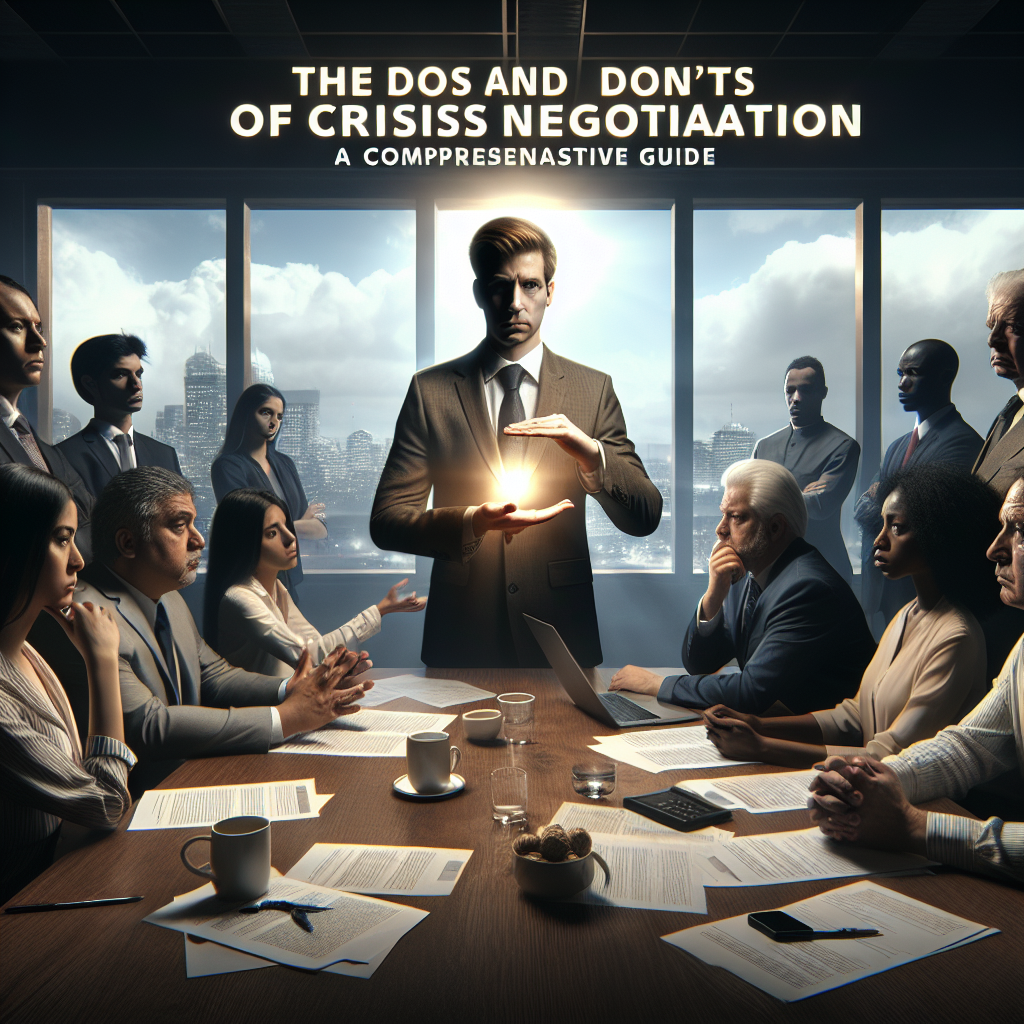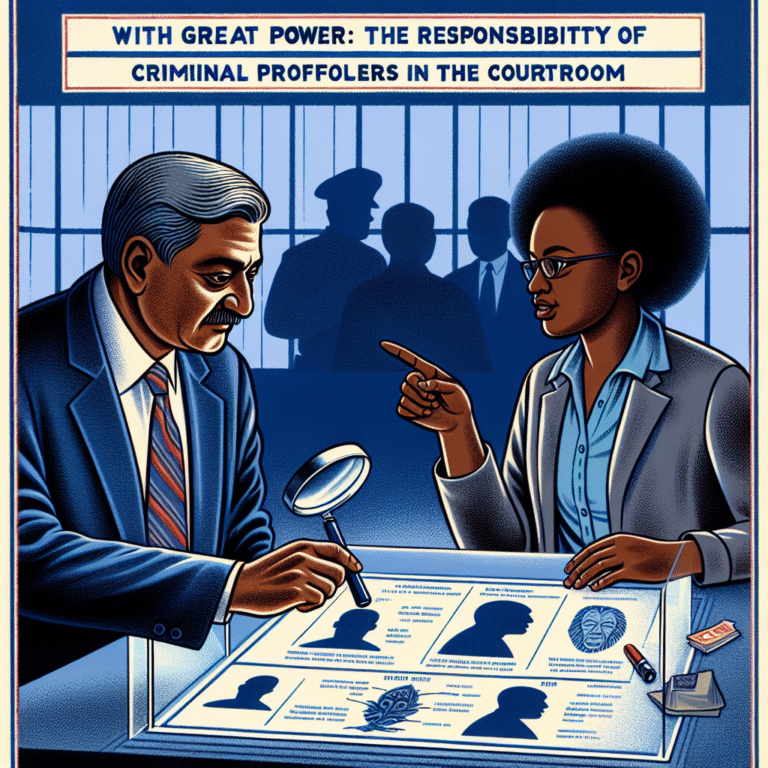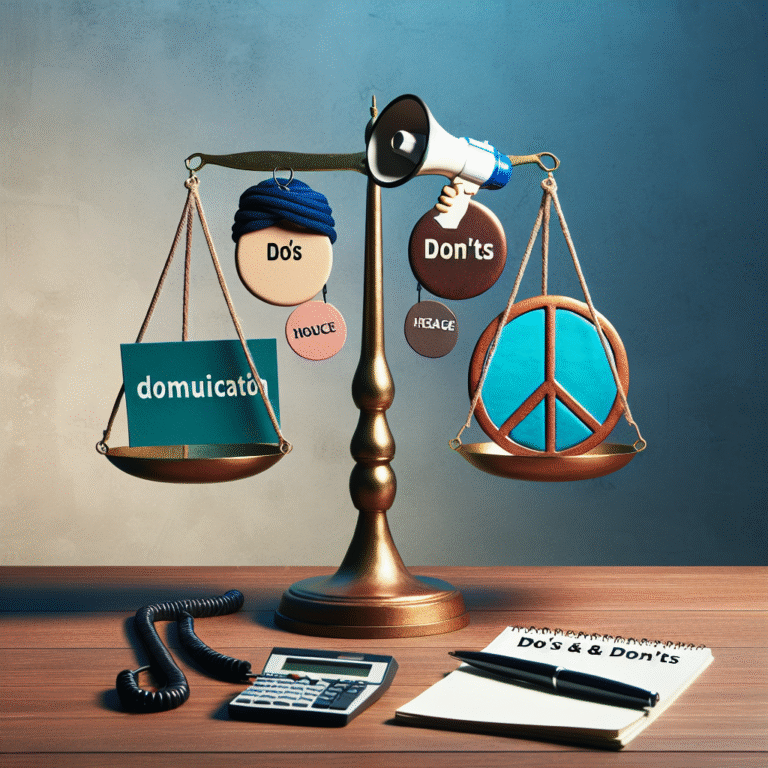
Introduction
In today’s unpredictable world, the ability to effectively negotiate during a crisis is not just a skill; it’s a necessity. Whether you’re a law enforcement officer responding to a hostage situation, a business leader managing a public relations disaster, or a community leader addressing social unrest, knowing the dos and don’ts of crisis negotiation can mean the difference between resolution and escalation. This comprehensive guide will delve deep into the best practices and pitfalls of crisis negotiation, providing you with actionable insights to navigate through high-stakes situations successfully. Let’s embark on this journey together, as we explore the critical aspects of negotiating during a crisis!
Understanding Crisis Negotiation
What is Crisis Negotiation?
Crisis negotiation is a process wherein trained professionals engage with individuals in crisis with the aim of resolving a situation peacefully and effectively. The stakes are typically high, often involving life-threatening scenarios or situations that could lead to significant harm.
The Importance of Effective Crisis Negotiation
Crisis negotiation serves multiple purposes:
- Preserve Life: The primary goal is to safeguard everyone involved.
- Minimize Harm: Reduce potential damage to people and property.
- Build Trust: Establish a rapport that can lead to cooperation.
- Facilitate Recovery: Promote healing and rebuilding after the crisis.
The Structure of Crisis Negotiation
Understanding the structure of a typical crisis negotiation can help us identify effective strategies:
- Preparation
- Establishing Contact
- Negotiation Tactics
- Resolution
- Debriefing
The Dos of Crisis Negotiation
1. Do Build Rapport
Establishing rapport is crucial in crisis negotiation. Building a connection makes the other party feel heard and understood.
Case Study: The 1993 Waco Siege
During the standoff with the Branch Davidians, FBI negotiators took significant steps to establish rapport with David Koresh. They spent time listening to him and understanding his beliefs, which allowed them to engage in more meaningful dialogue.
2. Do Stay Calm
Your emotional state can heavily influence the negotiation. Remaining calm helps to defuse the situation and instills confidence in the negotiating process.
Analysis: When negotiators exude calmness, it creates a ripple effect, encouraging the other party to mirror that behavior, ultimately leading to a more peaceful resolution.
3. Do Listen Actively
Active listening is vital in any negotiation, especially during a crisis. It demonstrates empathy and can provide critical insights into the individual’s motivations and fears.
4. Do Use Open-Ended Questions
Encouraging dialogue through open-ended questions helps you gain more information and insight while allowing the subject to express their feelings.
5. Do Maintain Flexibility
Adaptability is essential in crisis negotiations. Be prepared to pivot your strategies based on the evolving dynamics of the conversation.
The Don’ts of Crisis Negotiation
1. Don’t Make Threats
Threatening the other party can lead to escalation and can undermine any rapport you’ve built.
Case Study: The 1979 Iran Hostage Crisis
The use of threats was prevalent, contributing to an environment of fear and mistrust, which hindered a peaceful resolution.
2. Don’t Raise Your Voice
Raising your voice can escalate tension. Maintain a steady tone to promote calmness and collaboration.
3. Don’t Interrupt
Interrupting can be perceived as disrespectful and can disrupt the flow of information. Allow the other party to speak.
4. Don’t Make Assumptions
Assuming you know what the other party wants can lead to miscommunication. Instead, ask clarifying questions to fully understand their position.
5. Don’t Ignore Body Language
Non-verbal cues can provide significant insights during negotiations. Be observant of both your own body language and that of the other party.
Tools and Techniques for Effective Crisis Negotiation
Communication Techniques
Active Listening
Active listening involves fully concentrating, understanding, responding, and remembering what the other party is saying. Techniques include:
- Paraphrasing
- Summarizing
- Asking clarifying questions
Tactical Communication
Strategic use of language can shape the course of negotiations:
- Empathy Statements: Show understanding of the other party’s feelings.
- Encouragement: Use affirming language to motivate cooperation.
De-escalation Techniques
When tensions rise, de-escalation techniques can help:
- Use of Silence: Allow silence to create space for reflection.
- Counting Down: Employ a countdown to give everyone time to calm down.
Real-World Applications
Case Study Analysis
The Sydney Siege (2014)
During the Martin Place siege, negotiators worked tirelessly to establish communication with the gunman. They used many of the dos of crisis negotiation, including:
- Building rapport by acknowledging the gunman’s feelings.
- Remaining calm in tense situations.
- Employing active listening to gauge his needs.
Outcome: Their techniques eventually led to the safe rescue of hostages, highlighting the critical importance of effective negotiation strategies.
Infographic: Key Statistics on Crisis Negotiation Effectiveness
| Technique | Success Rate (%) |
|---|---|
| Active Listening | 85 |
| Building Rapport | 78 |
| Use of Empathy Statements | 70 |
| Maintaining Calm | 90 |
| De-escalation Techniques | 80 |
Conclusion
Mastering the dos and don’ts of crisis negotiation is essential for anyone involved in high-stakes situations. Employing effective techniques can create a pathway toward resolution, saving lives and promoting healing. By building rapport, listening actively, and remaining flexible, you can enhance your negotiating skills and achieve positive outcomes. Just remember: every crisis presents an opportunity—an opportunity to connect, to understand, and ultimately, to resolve.
FAQs
-
What is the primary goal of crisis negotiation?
The primary goal of crisis negotiation is to resolve a situation peacefully while prioritizing the safety and well-being of all parties involved. -
How important is rapport in crisis negotiation?
Building rapport is vital, as it fosters trust and encourages cooperation from the other party. -
What should I avoid during crisis negotiations?
Avoid making threats, raising your voice, interrupting, making assumptions, and ignoring body language cues. -
What techniques can help in de-escalation?
De-escalation techniques include using silence, counting down, and employing empathy statements to promote calmness. - How can I practice crisis negotiation skills?
You can improve your skills through role-playing exercises, simulations, and studying real-world case studies to learn from experienced negotiators.
By adhering to the principles outlined in The Dos and Don’ts of Crisis Negotiation: A Comprehensive Guide, you’ll be well-equipped to handle even the most challenging negotiations with confidence and skill.















